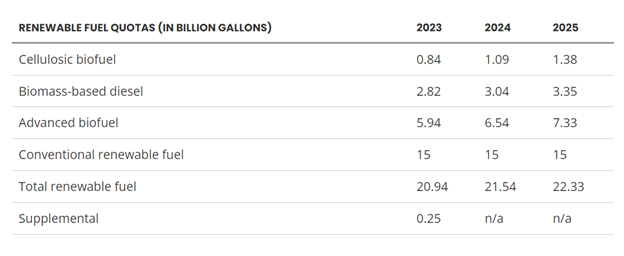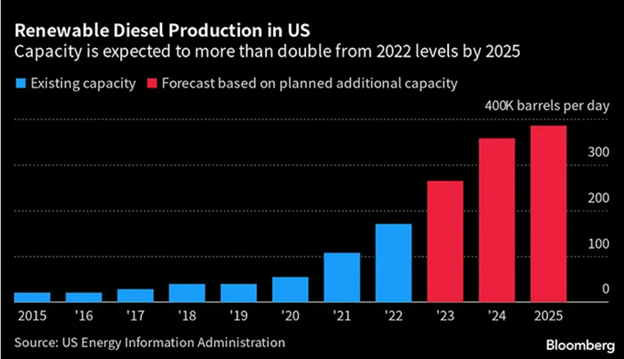EPA deals blow to biofuel producers
Agency will require record amount of renewable fuel to be mixed into gasoline, but still well below the increase sought by producers.

By Jennifer A. Dlouhy and Kim Chipman
The Biden administration dealt a blow to makers of bio and renewable diesel by setting federal quotas for the plant-based fuel that advocates say ignore a surge in production and a wave of investment in new manufacturing facilities.
Under a regulation released Wednesday, the Environmental Protection Agency in 2023 is requiring the use of 2.82 billion gallons of biomass-based diesel, generally made from soybean and canola oil — a 2.2% increase over the 2.76 billion gallons mandated last year. The mandates, including those for 2024 and 2025, are well below the increase sought by producers.
Soybean oil, a key feedstock in making biomass-based diesel, plunged 7% in Chicago to the daily price limit set by the exchange.
Overall, the EPA will require a record amount of renewable fuel to be mixed into gasoline and diesel over the next three years — up to 22.33 billion gallons in 2025. Even so, biodiesel makers have warned the White House that a surge in US production warrants much higher targets and that multi-billion-dollar investments in renewable diesel capacity hang in the balance.

The EPA rule undercuts certainty for clean fuel producers, oilseed processors, fuel distributors and marketers who “have all made significant investments to grow the industry rapidly over the next several years,” said Kurt Kovarik, vice president of federal affairs for the Clean Fuels Alliance America. “The industry responded to signals from the Biden administration and Congress aiming to rapidly decarbonize US fuel markets,” he said, but “the volumes EPA finalized today are not high enough to support those goals.”
The closely watched quotas have long been a source of tension for Republican and Democratic presidents as they seek to balance oft-competing oil refining and agricultural interests. President Joe Biden campaigned on promises to promote corn-based ethanol, but his administration has put muscle into a push for electric vehicles that could limit the market for all liquid fuels, whether made from plants or petroleum. The latest quotas have united a range of stakeholders in opposition, including biodiesel and ethanol producers, rural farm interests and oil refiners.
EPA Administrator Michael S. Regan defended the plan, saying in a news release it “reflects our efforts to ensure stability of the program for years to come, protect consumers from high fuel costs, strengthen the rural economy, support domestic production of cleaner fuels and help reduce greenhouse gas emissions.”
The agency is limiting the amount of conventional ethanol that could be used to fulfill quotas in 2024 and 2025 to 15 billion gallons each of those years — a reduction from the 15.25 billion gallon target it had proposed earlier and a defeat for makers of the corn-based fuel.
The change reflects updated government data forecasting a substantial decline in liquid fuel consumption, including 2025 gasoline demand that’s more than 5% below last year’s baseline, said Benjamin Salisbury, director of research at Height Capital Markets. With that lower demand, in practice, the 15 billion gallon ethanol target actually could demand higher blending rates, he told clients in a research note.
Even so, Emily Skor, chief executive officer of the Growth Energy ethanol advocacy group, said the EPA was lowering its ambition for conventional biofuels in a way that “runs counter to the direction set by Congress and will needlessly slow progress toward this administration’s climate goals.”
The EPA’s decision to jettison a controversial proposal to expand the Renewable Fuel Standard program to incorporate electric vehicle charging was cheered by some refiners. But Chet Thompson, president of the American Fuel and Petrochemical Manufacturers Association, said the final conventional biofuel targets are still “unachievable.” And the Fueling American Jobs Coalition representing some independent refiners and workers blasted the plan, saying it pushes ethanol blending levels too high, will foster “astronomically high” costs for compliance credits and “endangers tens of thousands of union jobs and our nation’s energy security.”
The EPA is also laying out plans to step up government oversight of the generation and trading of credits used to prove compliance with the biofuel requirements.
The quotas have taken on a new dimension for U..S renewable diesel producers, whose margins increasingly depend on the price of those credits.

Nevertheless, Darling Ingredients Inc., which through its Diamond Green Diesel partnership with Valero Energy Corp. is the top US producer of renewable diesel, said it was poised to benefit from the mandates. “We believe this is a positive for Darling,” company spokeswoman Suann Guthrie said by email.
More than 20 renewable diesel production facilities are proposed or under construction in the US, and studies show there are sufficient feedstocks available to supply them, said Michael McAdams, president of the Advanced Biofuels Association.
Some analysts emphasized renewable diesel producers have room to grow, including by exceeding the EPA’s targets.
Ken Morrison, a St. Louis-based independent commodity trader, said he doesn’t foresee the quotas hindering plans to expand US renewable diesel production.
©2023 Bloomberg L.P.
About the Author(s)
You May Also Like


.png?width=300&auto=webp&quality=80&disable=upscale)
